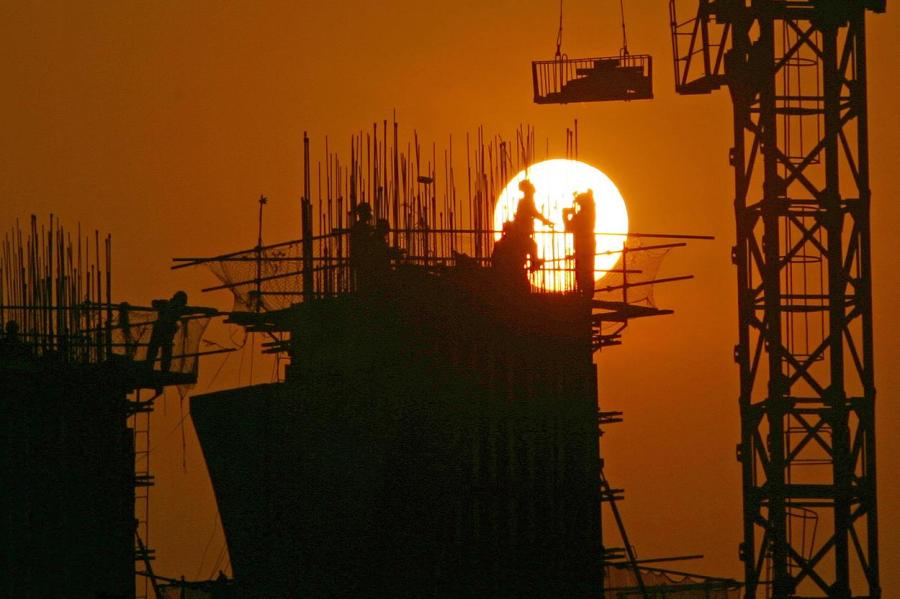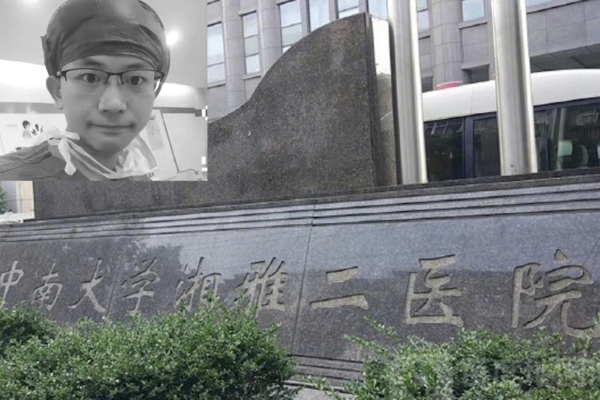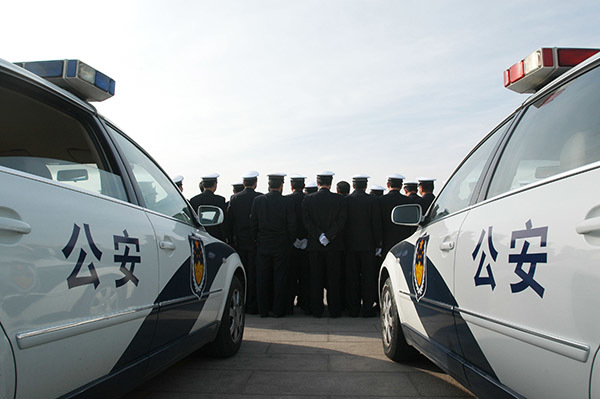Illustration: China's economy continues to decline. (Photo by China Photos/Getty Images)
[People News] According to a report by China Securities Journal on November 24, 2025, Gao Shanwen, who held dual roles as the director of the "Guotou Industry Research Institute" under Guotou Securities and the chief economist of Guotou Securities, has left the company. Furthermore, relevant information about Gao Shanwen is no longer available on the China Securities Association's website.
Chinese media have revealed that Gao Shanwen has faced social death.
This situation is not a typical executive turnover in the securities industry; rather, it represents another instance of a forthright economist experiencing social death, highlighting the CCP's merciless suppression of economic truths.
Gao Shanwen has served as the chief economist at both Everbright Securities and Guotou Securities for an extended period, with his research reports known for their incisiveness, often regarded as standards by institutional investors. By the end of 2024, Gao Shanwen had made several economic statements that the CCP considered to be highly subversive.
For example, on December 3, 2024, during an internal investment seminar at Guotou Securities, Gao Shanwen remarked that China's GDP growth rate had been overestimated by 10 percentage points over the past three years. On the same day, at the Guotou Securities 2025 Annual Investment Strategy Conference, he criticised the post-pandemic society for exhibiting a strange pattern of "vibrant elderly people, lethargic young people, and disillusioned middle-aged people." He pointed out that the urban employed population had decreased by 47 million, youth unemployment rates were alarmingly high, consumer expectations had collapsed, and young people were increasingly "tightening their belts and eating noodles in the dark," which led to a contraction in economic activity. His speech quickly gained traction on platforms like WeChat and Weibo, but was removed from the entire internet within hours. His WeChat public account and social media accounts were subsequently silenced.
In January 2025, The Wall Street Journal reported that Gao Shanwen once again raised concerns about the reliability of GDP data during a discussion at the Peterson Institute for International Economics in Washington on December 12, 2024. He estimated that the actual growth rate over the past 2-3 years was only about 2%, while the official figure was nearly 5%. He also criticised the government's economic stimulus measures as 'opportunistic' and difficult to deliver on promises.
Gao Shanwen's pointed comments directly provoked Xi Jinping. According to sources familiar with the matter, Xi personally ordered an investigation and disciplinary action against Gao. Additionally, Gao cancelled a lecture scheduled for January 11, 2025, at Nankai University, citing 'personal schedule' as the reason.
Gao Shanwen's last public appearance was on September 18 of this year, when he spoke via video as the president of the Peking University Finance Alumni Association at the welcome dinner for the 'Global Financial Forum' at Peking University.
Fear of the Truth: The Wave of Suppression During Economic Hardship
Gao Shanwen's situation is not an isolated incident but rather indicative of the Chinese Communist Party's ongoing suppression of speech and truth in the economic sector. In recent years, numerous economic bloggers and economists have faced arrest, censorship, or social ostracism for openly criticising the current state of the Chinese economy.
In May 2024, Zhu Hengpeng, the former deputy director of the Institute of Economics at the Chinese Academy of Social Sciences, was detained and dismissed for criticising Xi Jinping's economic management in a private WeChat group, which included complaints about the sluggish economy and subtle criticisms of Xi's 'personal life and death.'
According to a report by Caixin on May 8, 2024, Zhu Hengpeng highlighted in his article titled "Can Young People 'Pay for Their Hometown Parents' Retirement'?" that there is a stark contrast in pension benefits between urban and rural areas in China, as well as between private enterprises and public institutions. Many young individuals working in cities feel that their social insurance contributions are essentially funding the pensions of urban residents, while their parents in rural areas receive significantly lower pension benefits. Zhu suggested that if young people contribute to the pension system, their grandparents in their hometowns should receive the benefits, which would create a direct connection and enhance their motivation to contribute.
This proposal was intended as a targeted solution to the pension dispute in China, but authorities viewed it as a misguided economic strategy, even interpreting it as a form of indirect pessimism about the economy and irresponsible "reckless criticism of the central government".
In 2024, another figure caught in the backlash was Fu Peng, the chief economist at Northeast Securities. During an internal event in late November 2024, Fu stated that China's middle class is "rapidly shrinking" due to layoffs and salary reductions, which have led to panic and a "structural" shift in consumption patterns. He remarked that stimulus measures would likely be less effective than those implemented in 2008. The widespread attention his speech received indicated that he had stirred up significant discontent within the Chinese Communist Party, resulting in restrictions on his WeChat public account and the removal of his video.
In 2024, Liu Jipeng, the former president of China University of Political Science and Law, and Xu Xiaoyu, a former consultant at China International Capital Corporation, were also "low-key" due to their controversial statements.
Prominent economists are left stunned, and financial influencers are also facing misfortune. Financial writer Wu Xiaobo was silenced for his comments on the real estate crisis; scholars Ma Guangyuan and commentator Shui Pi faced platform restrictions for questioning consumer data; Glonghui founder Chen Shouhong and Dongfang Gangwan chairman Dan Bin were summoned for their 'negative predictions'.
These incidents are not random or collateral damage, but rather targeted actions under the systematic suppression of 'promoting economic optimism' by Xi Jinping and Cai Qi. On December 20, 2024, the China Securities Association issued a statement urging chief economists to 'properly guide market expectations and boost investor confidence', warning that 'improper words and actions' could result in dismissal. Regulatory bodies in various regions have limited analysts and fund managers from making public statements. The space for economic discourse has been severely and unprecedentedly restricted, replaced by a dominant narrative of 'positive grand storytelling'. This censorship underscores the reality that the Chinese Communist Party's economy is in serious trouble, and the authorities' efforts to silence dissent stem from deep concerns about regime stability.
A high-profile commemoration of Hu Yaobang's misleading legacy.
On November 20, 2025, the Chinese Communist Party (CCP) held a prominent commemoration for the 110th anniversary of Hu Yaobang's birth. Xi Jinping attended in person and delivered a speech, with Standing Committee member Cai Qi presiding over the event. Notable figures from the 'red second generation,' including Hu Deping and Liu Yuan, were present. In his address, Xi Jinping lauded Hu Yaobang, specifically stating: 'Comrade Hu Yaobang actively advocated and promoted reform and opening up, dedicating significant effort to advancing the construction of socialist modernisation.' He also remarked, 'Comrade Hu Yaobang viewed reform as a matter that relates to the overall success or failure of our cause.' This appears to be a collective remembrance of Hu Yaobang's spirit of reform and opening up, coinciding with the CCP's reaffirmation of 'focusing on economic construction' in the communiqué from the Fourth Plenary Session, suggesting that Xi Jinping may be signalling a shift in direction to restart the reform and opening up process.
However, it is peculiar that Xi Jinping did not mention Deng Xiaoping at all during his speech commemorating Hu Yaobang's 110th birthday. If a restart of reform and opening up is indeed intended, Deng Xiaoping, as the chief architect of China's reform and opening up, cannot be overlooked. In contrast, during the CCP's speech at the 90th anniversary symposium of Hu Yaobang's birth in 2005, Deng Xiaoping was referenced five times.
In reality, the commemoration of Hu Yaobang's birthday served merely as a platform for Xi Jinping's power dynamics. Hu Yaobang is regarded as the conscience of the CCP, yet Xi Jinping's speech refrained from addressing Hu Yaobang's genuine political aspirations and the painful experiences he faced during his lifetime, nor did it dare to confront the truth of the June Fourth student movement.
Hu Yaobang was ousted by Deng Xiaoping in 1987 for 'ineffective opposition to bourgeois liberalisation,' an event that directly led to internal divisions within the party and served as the catalyst for the 1989 Tiananmen Square protests. In his speeches, Xi Jinping often references Hu's 'rehabilitation of wrongful cases' and the 'discussion on standards of truth,' which were initially the reform initiatives spearheaded by Hu with Deng's tacit approval. However, Xi deliberately avoids mentioning Deng Xiaoping, indicating a strategic move to reshape historical narratives. He seeks to utilise Hu Yaobang's respected status within the party to establish a political platform for himself, repurposing Hu's political legacy into a propaganda tool for 'unwavering loyalty to the party' while discarding the notions of 'democracy and freedom.' This strategy supports Xi Jinping's 'two establishments' and aims to win over the second generation of red elites and gain the support of reformists, rather than genuinely reviving economic reforms.
Xi Jinping has created a self-perpetuating cycle of power that leads to stagnation.
The economy of the Chinese Communist Party has entered a severe downturn, characterised by a collapse in the real estate sector, soaring local government debts, persistently high youth unemployment, and a continuous outflow of foreign capital that is setting new records. The three pillars of investment, consumption, and exports have all come to a standstill, resulting in frequent social unrest and the potential for civil discontent. Xi Jinping's military influence has waned, and the political faction from Shaanxi has faced significant purges. His close associates, Cai Qi and Wang Xiaohong, have mysteriously disappeared for several days. While Xi Jinping still appears to hold considerable power, his authority has effectively been undermined and fragmented. To mask the domestic political and economic challenges, Xi Jinping has provocatively escalated tensions with Japan and crises in the South China Sea and Taiwan Strait. However, he has unexpectedly encountered a strong response from the Japanese government led by Sanae Takaichi, which has also heightened international concerns regarding potential military actions by the Chinese Communist Party.
Xi Jinping's public commemoration of Hu Yaobang contrasts sharply with his ruthless suppression of Gao Shanwen, revealing the intricate political strategies of Xi's administration. By capitalising on Hu Yaobang's 'revolutionary' legacy to garner public support, the regime employs censorship to obscure the realities of the economic crisis. Their ultimate aim is to avert a devastating political upheaval and to safeguard the party-state system at all costs.
In reality, however, Xi Jinping, who has a knack for squandering advantageous situations, is trapped in an irretrievable cycle within his power structure. Both the Xi Jinping administration and the Chinese Communist Party are destined to be consigned to history.
(First published in People News) △











News magazine bootstrap themes!
I like this themes, fast loading and look profesional
Thank you Carlos!
You're welcome!
Please support me with give positive rating!
Yes Sure!